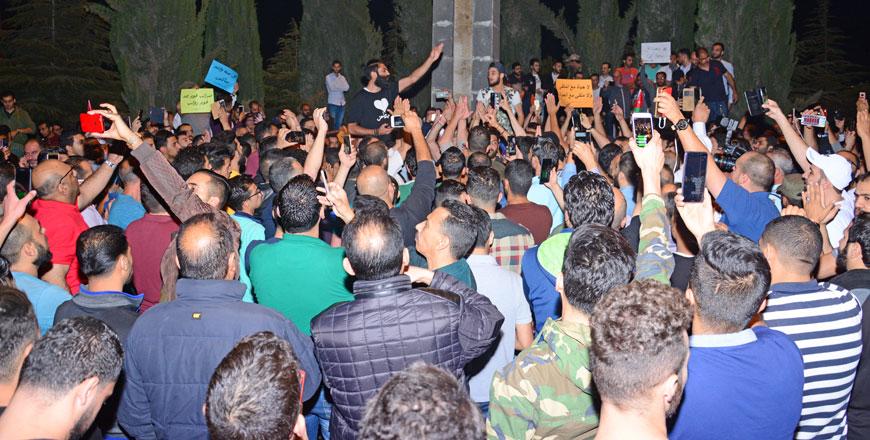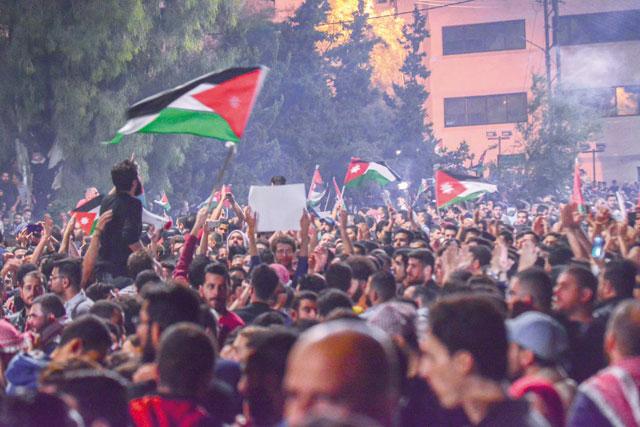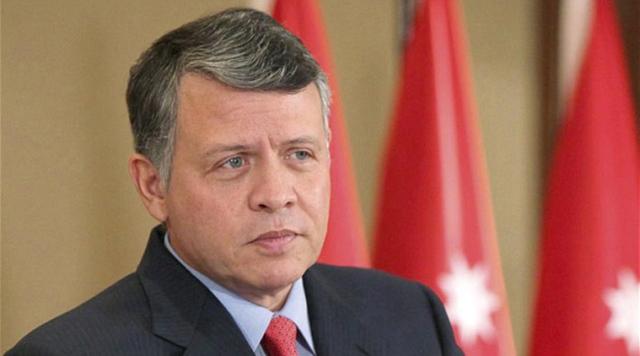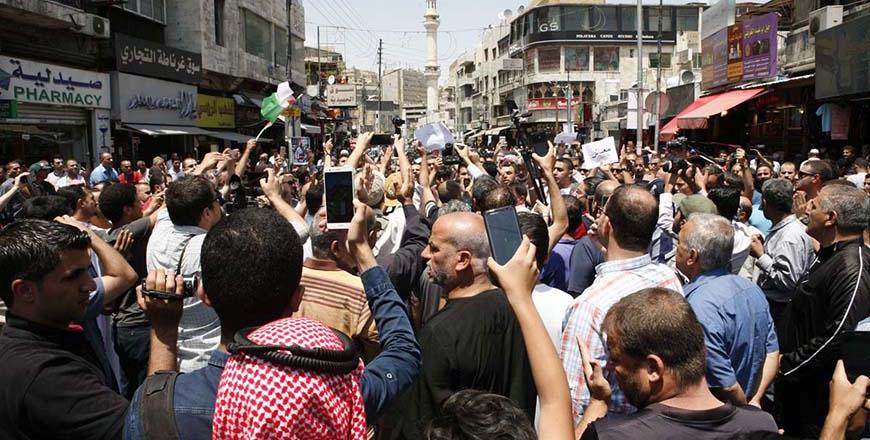You are here
Protests against tax bill continue for third consecutive day
By Mohammad Ghazal , Raed Omari - Jun 03,2018 - Last updated at Jun 03,2018

Thousands of Jordanians take to the streets following the announcement of price hikes for fuel derivatives (Photo by Amjad Ghsoun)
AMMAN — Protests continued on Saturday for the third consecutive night near the Prime Ministry in protest against the amendments to the Income Tax Law.
Due to heavy police presence, thousands of youth were split between two areas close to the Fourth Circle, where the Prime Minister office lies.
Jordan Times’ team covering on Saturday night rallies witnessed no vandalism or friction with police in their locations.
Similar protests were reported in various towns across the Kingdom, despite a deal between the government and unionists to continue dialogue over the disputed laws, which also include the Civil Service By-law.
Jordanians took to the streets over the weekend to protest the income tax draft law, calling on the government to step down.
Protests gained momentum Thursday midnight and early Friday after the government introduced a sharp increase to the prices of fuel derivatives and electricity, with protesters seen demonstrating in various governorates.
Despite a decision by the government, upon orders by His Majesty King Abdullah, to cancel significant hikes in the prices of fuel and electricity driven by the rising prices of crude oil in international markets, protests continued across Jordan with increasing demands for sacking the government.
In a statement run by the Jordan News Agency, Petra, Prime Minister Hani Mulki said the decision to raise the prices of fuel and electricity announced on Thursday will be frozen for the current month upon directives from the King.
“We are all here today to send a message to the government that we will not be silent this time… we want the unfair law withdrawn and we want the government to resign,” Mohammad Khawaldeh, one of the participants in a protest held near the Prime Ministry on Friday, told The Jordan Times.
“We are not a milk cow… the government should have many solutions to solve economic problems and should stop resorting to our pockets,” Khawaldeh stated.
Salem Jbour, another demonstrator, said that the government’s decision to sharply increase the prices of fuel and electricity has worsened the situation.
“This was not a wise move... The hikes in prices came one day after a huge strike where all Jordanians expressed their rejection of the law and all economic policies increasing burdens on them,” Jbour noted.
Late Thursday, the government announced an increase on electricity prices by 23.5 per cent and on fuel derivatives between 4.5 per cent to 5.5 per cent, citing a rise in prices of crude oil globally.
“The hikes made us all furious and more people joined the protests in Amman and elsewhere across the country,” Jbour told The Jordan Times.
On Friday, a demonstration took place in downtown Amman with participants calling for the immediate withdrawal of the law.
Protests also took place in Irbid, Zarqa, Karak, Ajloun, Jerash, Tafileh, Ramtha and Aqaba, among other places, in protest of the law, the Jordan News Agency, Petra, reported.
Road closures, burning tyres, anti-government slogans calling on the government to step down and cars parked in the middle of main streets in Amman and in front of several government buildings were recorded, with reports of police intervention to bring the snowballing situation under control.
‘No for vandalism’
The Public Security Department (PSD) called for respecting the law and refraining from any act of vandalism and keeping the protests peaceful, noting that it dealt with several protests in cooperation with other security forces over the weekend.
The department also urged citizens not to violate the law, according to a PSD statement sent to The Jordan Times, citing cases of protesters blocking roads and assaulting security forces personnel.
The statement said that some demonstrators tried to destroy public and private property, adding that the PSD would deal firmly with such unacceptable practices with the appropriate use of force in accordance with the law. It also urged citizens to abide by instructions made by the security forces present at the protests to protect them and their right to express their opinion.
Head Professional Associations Council Ali Obous on Saturday stressed the citizens’ right to express their views, and voiced the council’s support of civilised and peaceful protests demanding legitimate rights.
The council, he said, condemns any acts of vandalism that are exercised by individuals, adding that such acts have a negative impact on the success of peaceful protests.
Obous also reiterated the call on the government to withdraw the law, adding that the hikes in prices fuelled the protests.
On Saturday, Al Wasat Islamic Party voiced its support for civilised and democratic protests in rejection of the economic policies that increased burdens on citizens, but warned against violating the law.
“We support civilised protests but not spreading chaos, burning tyres and blocking roads… The Constitution guarantees Jordanians’ right to protest and express their opinion but in line with the law,” the party said in a statement sent to The Jordan Times in which it urged the government to take into account the current difficult economic conditions and to reduce burdens on citizens or resign and withdraw the income tax law.
The income tax draft law, which is part of reforms the government is implementing as part of a programme with the International Monetary Fund, mainly focuses on three aspects: improving tax collection, curbing tax evasion and boosting tax revenues, which are expected to increase by JD300 million annually.
The bill broadens taxpayers’ base by 5 per cent to reach nearly 10 per cent of the population and toughens penalties on tax evaders. It relabels tax evasion from a misdemeanour to a felony with stiffened penalties of imprisonment and fines.
Related Articles
AMMAN — The Professional Associations Council announced on Tuesday that it will go ahead with another strike today in protest against the in
AMMAN—His Majesty King Abdullah on Friday ordered the government to freeze new price hikes on fuel derivatives and electricity.In a statemen
AMMAN – Despite decision by the government, upon orders by His Majesty King Abdullah, to cancel significant hikes in the prices of fuel and



















